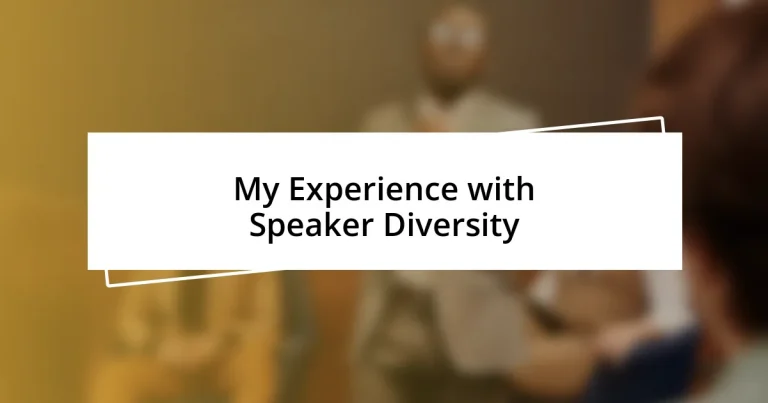Key takeaways:
- Embracing speaker diversity enriches conversations and fosters a deeper understanding of complex issues.
- Authenticity and relatability in speakers create stronger connections with the audience and inspire dialogue.
- Active efforts to challenge unconscious bias and broaden representation are essential for achieving true diversity in speaker selection.
- Involving diverse stakeholders in planning and committing to ongoing evaluation enhances the impact of events and fosters inclusivity.
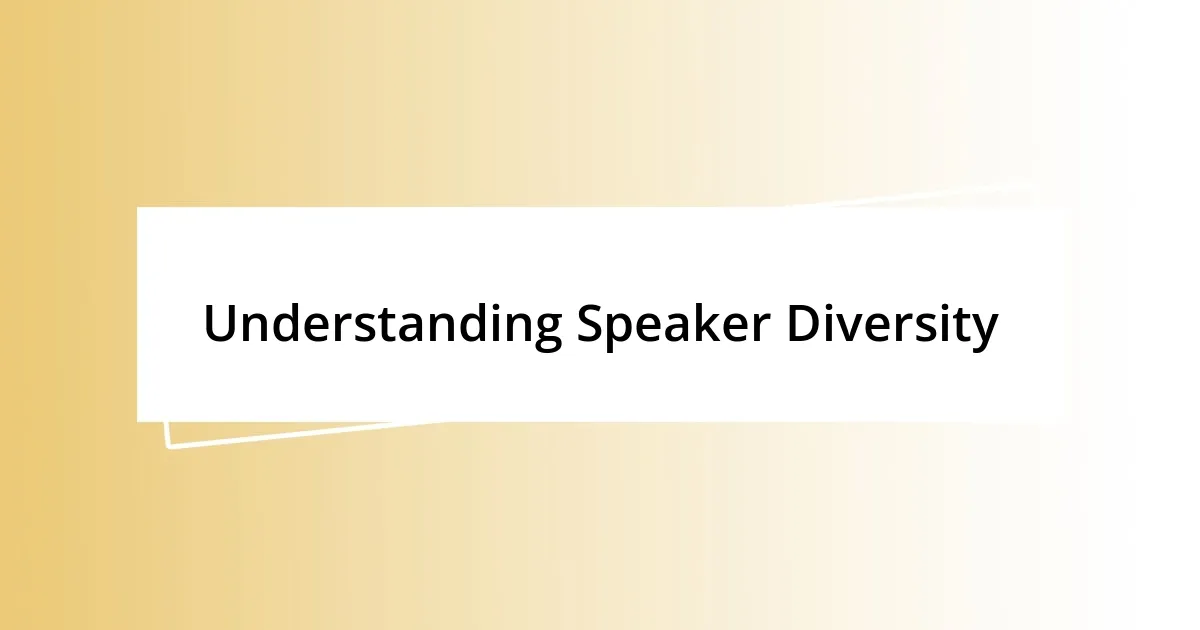
Understanding Speaker Diversity
When I think about speaker diversity, I can’t help but reflect on the different perspectives each individual brings to the table. I remember attending a panel discussion where the speakers hailed from distinct cultural backgrounds, and it was eye-opening. Listening to their varied experiences made me realize how much I had been missing out on by not embracing a wider array of voices.
Have you ever found yourself nodding along but not fully understanding the depth of someone else’s story? For me, that realization hit hard during a conference where a speaker shared their journey through systemic challenges that were completely outside my realm of experience. It was a moment of both discomfort and growth, as it taught me the value of listening deeply and empathetically to diverse journeys.
Moreover, I believe understanding speaker diversity goes beyond just representation; it’s about fostering an environment where unique voices can be heard and valued. I recall discussing ideas with a friend from a different professional background, which sparked a creativity I hadn’t anticipated. It made me wonder: how often do we limit our understanding by surrounding ourselves with similar perspectives? Embracing diversity in speakers not only enriches conversations but also broadens our horizons in ways we may not initially foresee.
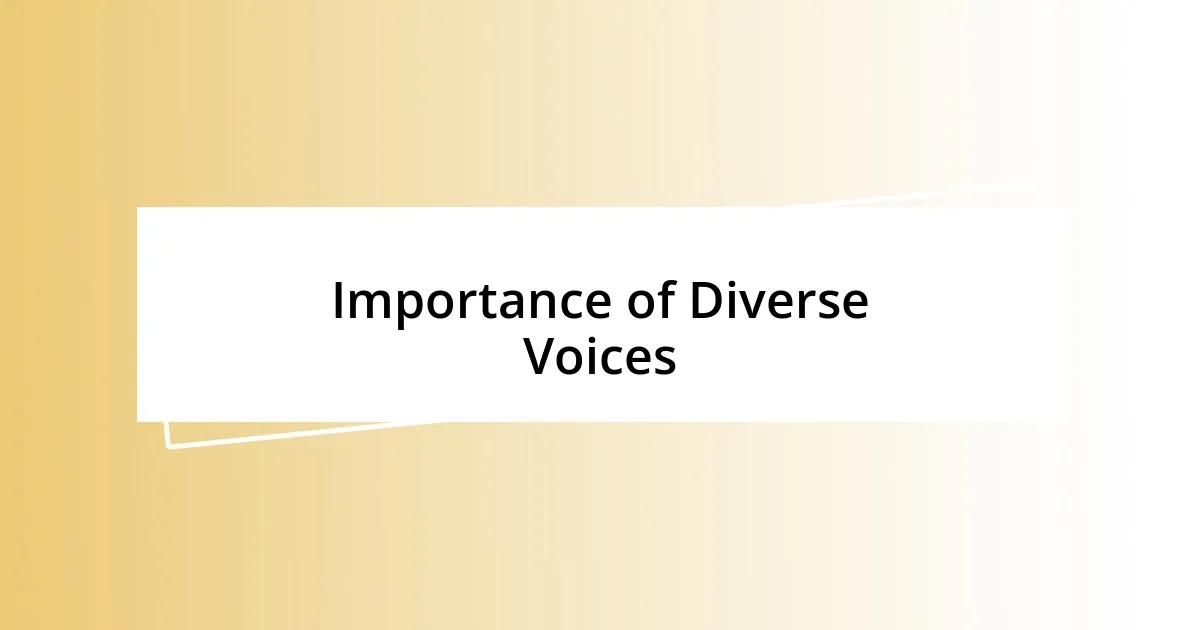
Importance of Diverse Voices
Diverse voices are crucial in any discussion as they challenge our preconceived notions and compel us to think critically. I remember participating in a workshop that featured speakers from various fields, including tech, art, and sociology. Each speaker offered a unique lens through which I began to see familiar topics in entirely new ways, expanding my understanding and appreciation for different disciplines.
It’s fascinating how diverse perspectives can spark innovation. During a brainstorming session with colleagues from different backgrounds, I noticed how their varied experiences led to creative solutions I would never have considered. Each recommendation opened up further discussions, highlighting a richness in ideas that only such diversity could provide. It made me wonder: how much more could we achieve if we actively sought out these diverse voices in every meeting?
Engaging with speakers from different walks of life not only enlightens but also humanizes complex issues. I’ll never forget a panel where a speaker shared their struggle with mental health in a predominantly stigmatized field. Their courage to speak openly made others feel safe to share their experiences. This kind of dialogue fosters empathy and understanding, creating a community where people feel supported and heard.
| Benefits of Diverse Voices | Examples |
|---|---|
| Innovation | Creative solutions arise from varied experiences |
| Empathy | Personal stories foster understanding and connection |
| Broad Perspective | New viewpoints expand understanding of complex issues |
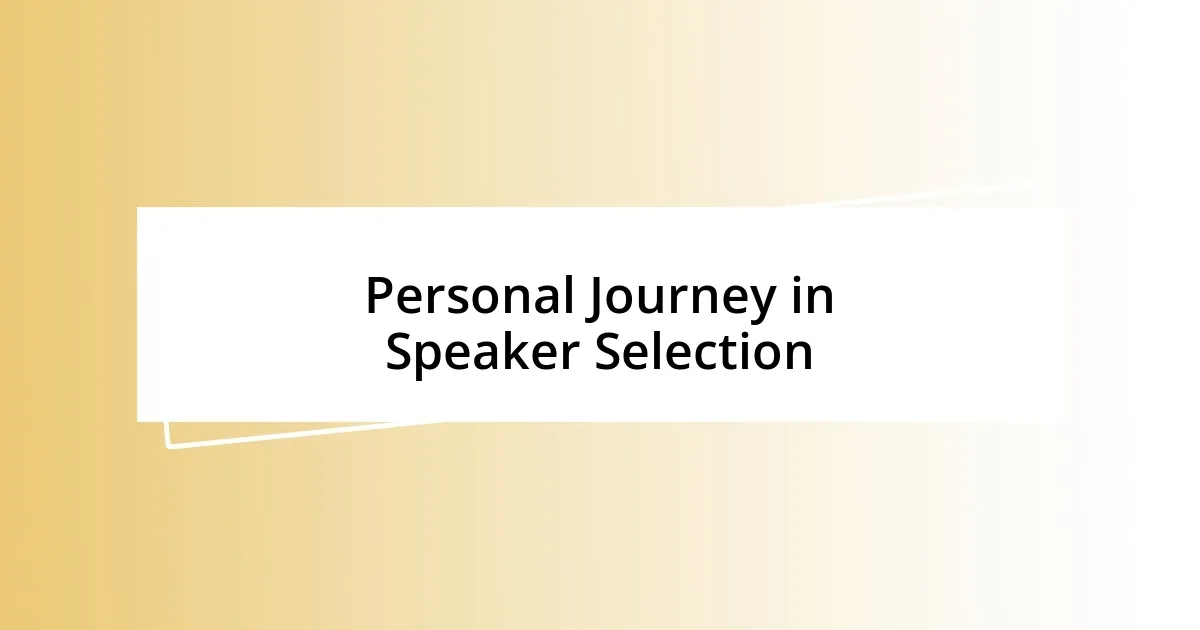
Personal Journey in Speaker Selection
Selecting speakers for events has been a transformative journey for me. I vividly remember a moment when I chose a speaker whose story was quite different from my own—an immigrant entrepreneur sharing their challenges and triumphs. That talk moved me profoundly, as it didn’t just shed light on their struggles but opened my eyes to the resilience and dedication required to navigate such challenges. I felt an emotional connection to their journey, realizing that every speaker has something unique that can touch the hearts of listeners.
Reflecting on my speaker selection process, I often remind myself of the importance of variety and experience. Here are key insights I’ve gathered along the way:
- Broader Range of Experiences: Each speaker reflects different life journeys and experiences.
- Challenging My Assumptions: Listening to varied perspectives allows me to confront and rethink my own biases.
- Building Community: Diverse speakers create a sense of belonging and inclusivity for all attendees.
- Fostering Curiosity: I often feel inspired to learn more about subjects outside my primary interests, thanks to the diverse speakers I engage with.
This exploration has profoundly enriched my understanding, reinforcing the idea that every voice—especially those that differ from my own—deserves to be heard.
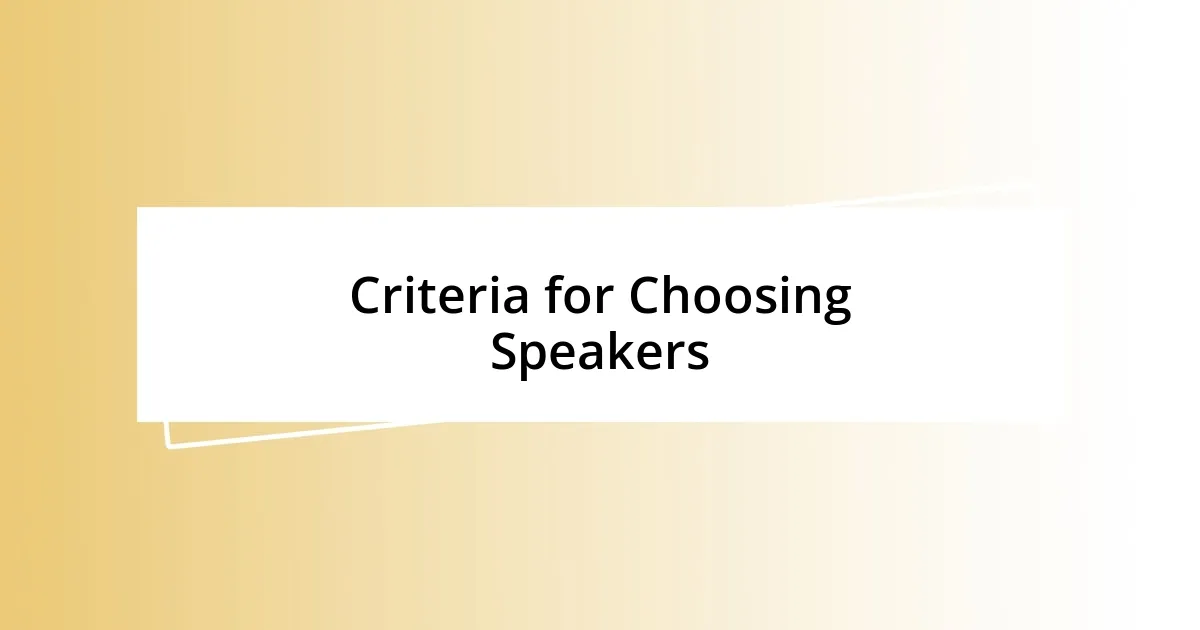
Criteria for Choosing Speakers
When I think about the criteria for choosing speakers, one essential factor stands out: authenticity. I recall a memorable event where the speaker’s genuine passion for their cause lit up the room. Their story was not only heartfelt but also relatable, making it easier for attendees to connect. Isn’t it remarkable how a speaker’s personal authenticity can create an immediate bond with the audience?
Equally important is diversity of experience. For instance, I once had the opportunity to select a panel for a conference that included a local activist, a corporate leader, and a grassroots organizer. Each of them brought diverse perspectives that sparked rich conversations. I’ve learned that embracing speakers from various industries and backgrounds allows for a more dynamic dialogue that challenges conventional thinking. How often do we limit ourselves by sticking to familiar narratives?
Lastly, consider the impact of relatability. During a workshop, a speaker shared their journey through failure before achieving success. The vulnerability they displayed resonated deeply with many of us. It made me realize that sharing struggles, rather than just successes, can inspire and provide hope to others facing similar challenges. Don’t you think that relatability can transform a presentation into a shared experience, fostering a deeper connection among participants?
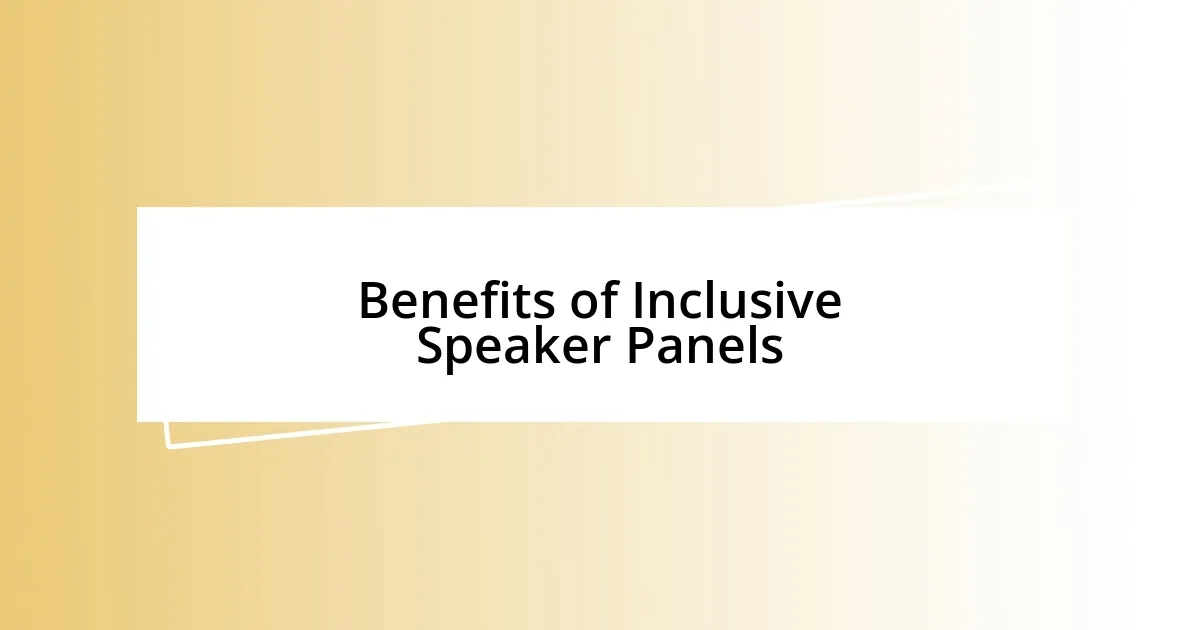
Benefits of Inclusive Speaker Panels
Inclusive speaker panels offer a wealth of benefits that often go unnoticed. One of my most impactful experiences was at a tech conference where diverse speakers illuminated issues like gender bias in the industry. I remember sitting in the audience, feeling a powerful sense of solidarity as those speakers shared their stories. When diverse voices echo across the stage, it creates a reflective mirror that encourages all of us to examine our beliefs and assumptions.
Community building is another advantage I’ve observed firsthand. At a recent event, we featured speakers from various cultural backgrounds, and the audience’s energy shifted. There was a palpable sense of belonging. Attendees began to share their own stories, inspired by the speakers’ narratives. Isn’t it fascinating how vulnerability can spark connection? When speakers represent different walks of life, it fosters an environment where everyone feels valued and heard.
Lastly, I find that engaging with inclusive panels fosters curiosity and broadens knowledge. During a panel discussion on climate change, a scientist brought in perspectives from underrepresented communities disproportionately affected by environmental issues. I left that session eager to explore those narratives further. Have you ever left an event feeling compelled to learn more simply because a speaker introduced you to a new angle? That’s the magic of diversity—it not only enriches our understanding but also expands our horizons in ways we hadn’t anticipated.
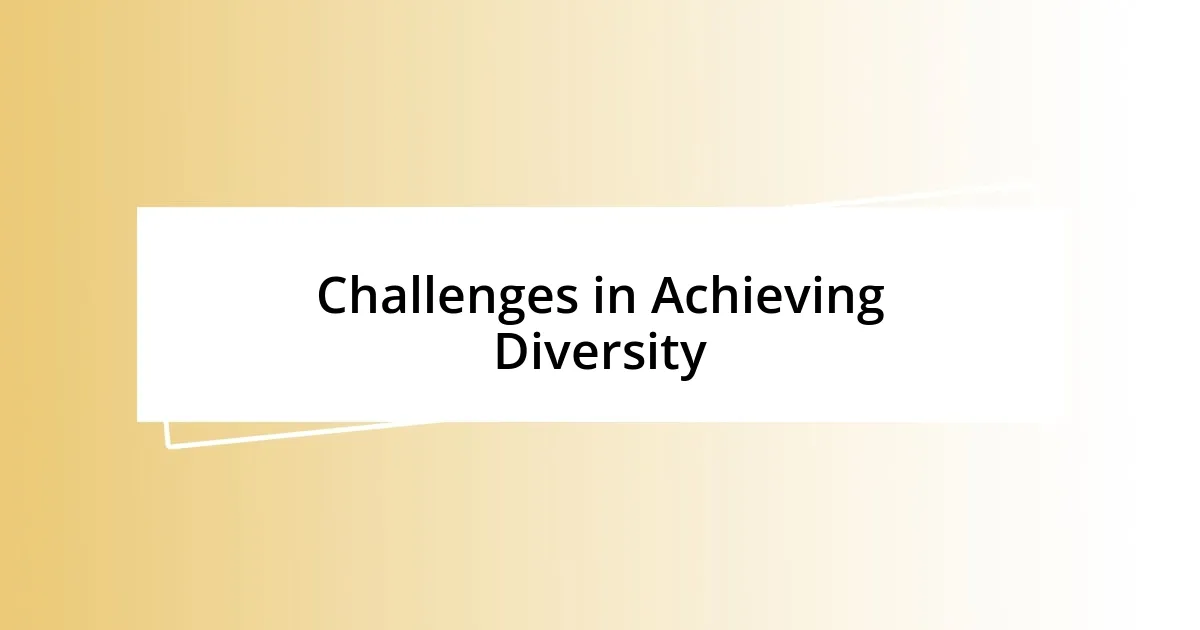
Challenges in Achieving Diversity
When striving for speaker diversity, one significant challenge I often encounter is the unconscious bias that exists in our selection processes. It’s easy to gravitate toward speakers who mirror our own experiences, which can lead to a homogeneous lineup. I remember a time when I was selecting speakers for a workshop; despite my best intentions, I instinctively favored familiar faces within my network. Have you ever found yourself in a similar situation, where comfort trumps diversity? It made me realize how crucial it is to actively seek out voices outside my usual circles.
Another hurdle is the limited representation of certain groups within professional networks. During a panel I organized, I struggled to find accomplished women of color in tech who were available to speak. It was disheartening to see such remarkable talent underrepresented and often overlooked. Why is it that some fields seem to perpetuate the same narratives? This experience taught me that expanding the search for speakers requires not just effort but a willingness to challenge the status quo and reach into less traditional venues.
Lastly, logistical barriers can impede the quest for diversity. Costs associated with travel or speaker fees can deter the inclusion of a broader spectrum of voices. I recall an enlightening session where a community leader had to decline my invitation due to financial constraints, despite their potential to inspire many. How often do financial hurdles prevent valuable perspectives from being shared? It highlights the need for organizations to prioritize funding for diverse voices to create events that reflect the richness of our communities.
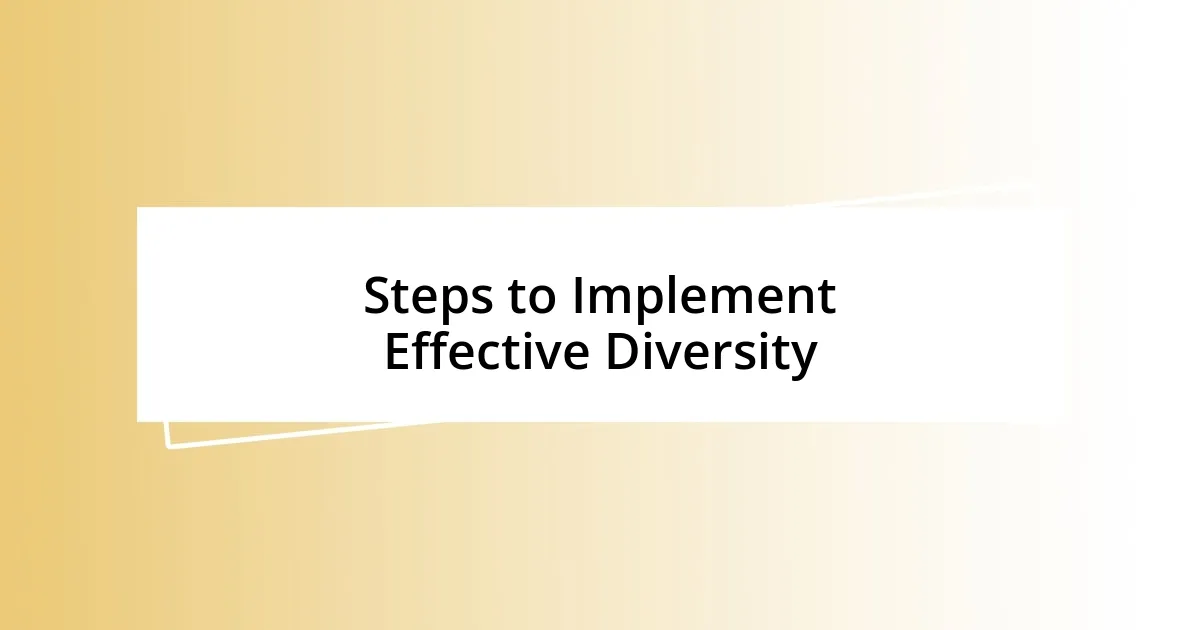
Steps to Implement Effective Diversity
One of the first steps I’ve found essential in implementing effective diversity is to create clear, intentional guidelines for selecting speakers. At a recent event I organized, we established a checklist focusing on representing various backgrounds, experiences, and ideas. It was enlightening to see how this shift in approach not only opened up our options but also broadened the conversation. Have you considered how a simple guideline can change the entire atmosphere of your event?
Next, actively involving diverse stakeholders in the planning process makes a world of difference. I remember attending a community workshop where organizers sought input from local representatives before finalizing their panel. This collaborative approach not only built trust but also ensured the topics discussed were relevant and resonated with our audience. Isn’t it remarkable how everyone benefits when diverse perspectives are included from the beginning?
Finally, I’ve learned that ongoing evaluation is crucial. After each event, I gather feedback specifically about speaker diversity and its impact. One time, a participant shared how a speaker from a different background changed their perspective on a topic. It reminded me that diversity isn’t just a goal but a continuous journey. Are we truly listening to our audience, and are we ready to adjust our strategies based on their insights? Engaging in this reflective practice makes our events not only more impactful but also more inclusive over time.












